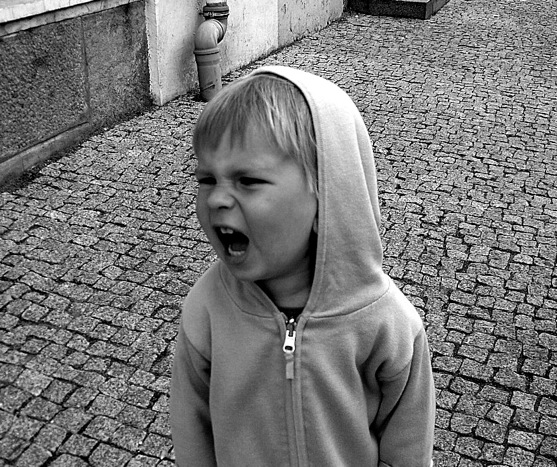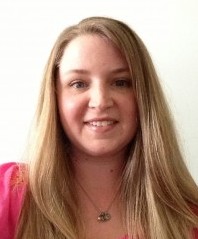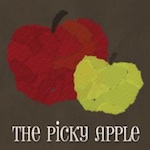Life With A Spirited Child: Labels
This is the third post in the Life With A Spirited Child Series. Missed a previous post?
Life With a Spirited Child: New Series Intro
Next week we’ll start discussing parenting tactics for each of The Characteristics.

image from mdanys via Flickr Creative Commons
Wild. Out of control. Disruptive. Crazy. Whiny.
Those are all words I have used to describe my three year old son in the last week or so. He’s been challenging and I’ve been in tears several times. I’ve stalled on this Spirited Child post because I’ve been feeling completely overwhelmed by his crazy energy and less-than-stellar behavior. At the same time, I need to be writing this post now more than ever.
Because you know what all of those labels have in common? They’re ALL NEGATIVE.
Negative Labels Have Negative Effects
With spirited children in particular, it becomes all too easy to label them in this negative manner. As parents of spirited children, it’s crucial that we stop putting negative labels on our children, and I’m writing this post to myself as much as to the rest of you! We need to see the positive or at least the potential strength that each of these behaviors presents.
This is especially important when you’re speaking about your child in your child’s presence. This is definitely something I need to work on. The Littlest Apple has said “I’m wild” and “I’m not a good listener” to me recently, and that just shows how much I’ve said those things myself. By placing negative labels on our children, those labels become expectations, and they start to act in ways consistent with those expectations. They become wild. They become disruptive. They become bossy and manipulative. This is called the Pygmalion Effect, a form of self-fulfilling prophecy. Kind of scary, huh?
Encouraging words and teaching your child how to handle these behaviors with a firm but kind heart would go so much further, don’t you think?
Change the Labels
We should speak about our children and to our children with words that make them (and us) feel good. We should use words that are positive. Words that focus on what’s right about their behavior, not what’s wrong with it. Think about advertising companies and realtors and the words they use to describe their products. The words that make you think how cool, fun, charming and useful their product is . We need to turn our negative labels into labels that make us smile, that make us proud, and even ones that make us laugh. Labels, whether spoken aloud or internalized, affect how we feel, act, and think about our spirited children. But how do you even begin to change your thinking about a trait that drives you crazy?
Here are some examples of negative labels with their more positive counterpart in italics:
bossy  future manager
distracted, not listening   curious, perceptive
wild, never stops  energetic, full of life, busy
resistant  focused
whiny  expressive
negative  analytical
reckless  adventurous
nags, annoys and otherwise drives you crazy to get what he wants  argues intelligently for what he wants
argumentative, demanding  persistent
picky selective
rebellious  independent
manipulative  charismatic, persuasive
overwhelming  powerful
stubborn  goal-oriented
thin-skinned, high-strung  sensitive
dangerous thrill-seeking behavior  likes to learn, explore, try new things
noisy, loud enthusiastic, zestful
explosive  dramatic
Look For the Positive.
(Even if you have to search really hard!)
I know some of you are rolling your eyes right about now. I know first hand that this is a DIFFICULT exercise to do, and that it can be quite a stretch to put a positive spin on some of your spirited child’s more challenging behaviors. Believe me, when my son is spitting orange juice all over the living room carpet, the last thing I’m thinking is “oh, he’s so imaginative!”. I want to yell “What on EARTH where you THINKING?!”
Rethinking the way we label our children is NOT easy, particularly in the midst of their more challenging behaviors. That is why I encourage you to take a few minutes to sit down and work through this exercise when your blood ISN’T boiling at their latest shenanigans. List all of the adjectives and labels you’ve placed on your child recently. Be sure to use not only labels that you’ve used or thought, but also those your friends, family, and teachers have used to describe your child.
Even the awful ones.
ESPECIALLY the awful ones!
Then try your hardest to come up with a positive “spin” for each of those traits. Sit down with your spouse, a family member or a friend who knows your child well if you’re really struggling. Take some deep breaths and think of your child at his most charming and loveable self. Recall some of your favorite memories of your child. The ones that make you smile or chuckle. (I’m smiling and feeling calmer already!)
For me, that includes The Littlest Apple’s infectious laughter and his enthusiasm and zest for construction trucks and Buzz Lightyear. (As you can see from the list above, those are the words and images I remind myself of when I’m thinking “You’re too LOUD!!”) When he’s jumping off the furniture, I try to remind myself that he’s energetic and full of life (and wishing I had that kind of energy). When I have to remind him for the 5th time to clean up his toys, I conjure up an image of Curious George, his favorite monkey, who is just so curious that he can’t help himself from exploring everything around him instead of cleaning up.
Practice Parenting With the Postive Labels
Instead of saying, “No! Stop! Get down! Listen to me! I said NO!”…..
you can say things like “You sure do have a lot of energy today! Why don’t we go for a short walk around the block?” or “You are very persistent with your requests to play instead of getting ready for bed!” This takes lots of practice, and I’m definitely still in the beginner stage here. I get so angry and frustrated with The Littlest Apple’s behavior sometimes, but I’m forcing myself to call to mind this list of negative/positive traits.
If we can start using this kind of language to transform how we think about our spirited children, we can become more tolerant, kind, understanding and creative in our efforts to help our spirited children stay “on track. “ Besides, doesn’t it feel so much better to the parent of a child that is curious, energetic, persuasive, creative and enthusiastic? That’s how I can describe The Littlest Apple, and now I’m smiling as I write this. What a neat kid! Using those labels makes me feel so proud and lucky to be his mom!
Words make all the difference!
How would you describe your spirited child with these new positive labels?




I love this post. I was honored to see Zig Ziglar speak live. He said we give kids labels and they fulfill the labels. His example? When your child wants to help with the dishes you say, “OK, but be careful not to break them.” Sounds harmless enough, don’t you think? But now imagine saying, “I would love having you help because I know how just how good you are at being careful.” That sounds SO much better. I was really struck by this when he said it. I often try to do that with Elizabeth… sometimes I forget but when I remember I am proud of myself. GREAT topic.
Hi Cara,
Just wanted to let you know that I nominated you in the 2010 Homeschool Blog Awards (Best Homemaking or Recipes Blog).
Warmly,
Mari-Ann
Katherine,
I adore Zig Ziglar! I’ve read/listened to/watched lots of his stuff. And what a great reminder that how we say things makes a big impact on our kids!
Mari-Ann,
Wow! Thank you so much! I’m flattered!
This is wonderful post, one that I should read every day as a reminder to be positive and kind. I tend to lose my cool quickly (too much going on). But, just this morning, when my spirited girl asked to hold an egg, I handed it too her with a “I know you will be careful and gentle with it”. And she was. Thank you for this.
I really like this post. You have helped me to think about my restless, whiney five year old in a new light! So glad I found your blog today!
Since your first post in this series I have been doing what I call ” Throwing up rainbows” basically showering my son with positive energy and spins. SO I was so excited to read this post. Meltdowns have diminished , bossy ( ummm I mean persistent leadership 😉 ) has been much more manageable and we have in general been so much happier. It is amazing how when I treat my son more like I would treat students how much more in control he is. I have to admit to it being pretty emotionally tired at the end of the day but it’s worth it , I would rather be tired but happy than sad and anxious.
This series is so helpful – it keeps me thinking and making things like a simple change in labels a priority. Thank you!
This post will come in very handy in our household. Our biggest word problem is “shy” which is now used by our daughter as an excuse for not playing or trying to talk to other children. Social anxiety is her biggest challenge but since we’ve labelled her as shy it has bit us in the butt now that she uses that word as her crutch. Help?